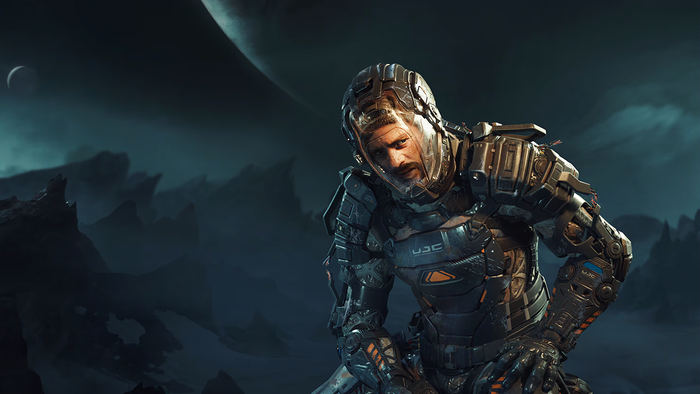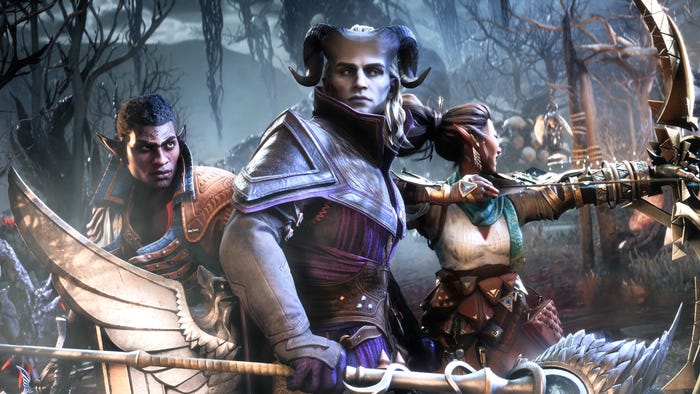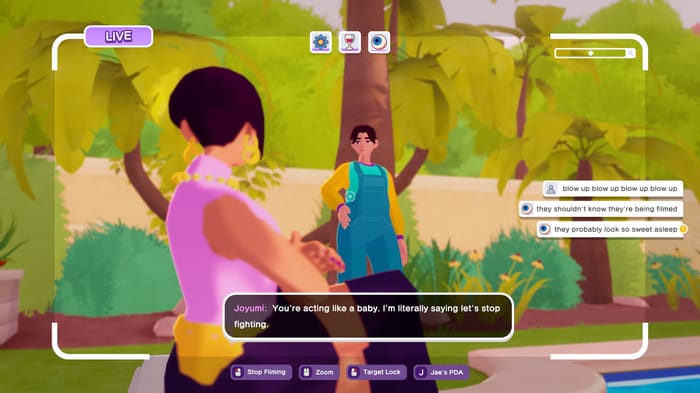Question of the Week Responses: Genre-defining Games
In the latest Question Of The Week response, we simply asked: "For any genre of your choice, what is the game that defines that genre for you?" Spanning most of the major genres, our respondents take us on a passion-filled jaunt through video games present and past, highlighting a few of the titles that stand out in their minds as truly epitomizing a particular style of gameplay.

In the latest Question Of The Week response, we simply asked: "For any genre of your choice, what is the game that defines that genre for you?" Spanning most of the major genres, our respondents take us on a passion-filled jaunt through video games present and past, highlighting a few of the titles that stand out in their minds as truly epitomizing a particular style of gameplay.
Illustration by Adam Reed |
Adventure
Although the 'adventure genre' actually covers a multitude of styles, from the classic 2D graphic adventure through the 3D platform action adventure, our respondents found a number of games from the '80s and '80s to be passionate about:
I would have to go for The Secret of Monkey Island for defining the adventure game genre! I remember being totally disconnected from the real world while playing this game way back. It really conveyed the idea of "adventure" game, in the sense that on top of being an adventure game as the genre defines it (a narrative interaction in which you visit locations, find objects and use them together or in other areas to allow the progression of the story), it really WAS adventurous! The locations were exotic and the characters had a personality. All in all, the world had a distinct feel and it totally immersed me. Sadly, I don't think any recent game gave me that same feeling... any developer out there up for the challenge?
-Mario Di Pesa, UbisoftAdventure: Legend of Zelda:The Wind Waker (until the next Zelda comes out) The gameplay in Zelda is so natural, responsive, and intuitive you can't help but have fun. Even though many have criticized the graphic style, if you look at it without comparing it other titles in the series, it's fresh and filled with beautiful detail. Who wasn't amazed when they first set sail, at the gulls gliding by the mast. Despite being on the easy side, if you really explored the world you could spent a decent amount of time playing. Have I mentioned the controls? I remember picking up an old beat-up controller at the local EB Games, that looked like it probably wasn't going to work, and playing some of Wind Waker . Instantly I was hit by the responsiveness of the controls and how fluid the characters movements were. I thought, "damn, that's tight!"
-Govinda Berrio, NEBCOAs an adventure game aficionado, my choice has to be Funcom's The Longest Journey. It has exploration of "empty worlds", plenty of interaction with NPCs, a well-developed story, character development of the protagonist, many puzzles/challenges to solve, and it is done without any fighting sequences.
-Marilyn Nelson, Mysterymanor.netAdventure - Legend of Zelda: Ocarina of Time. The immersion in this game brought players into the world of Hyrule. We were no longer in our living rooms, we were running around in a green tunic in the kingdom of Hyrule. Classic game!
-Randy Wilson, Broken Attitude ProductionsIt's a dead genre for the most part, excepting your occasional Internet indie project, but scenario design for 2D action adventures is epitomized in Castlevania: Symphony of the Night. Super Metroid had better replay value and better flow, but Symphony had atmosphere to the extent that the castle felt alive, less like a collection of tiles than an entity that you had to negotiate with. The secret knowledge of the second half of the game only reinforced the notion that the castle was not some videogame level design, but a gallery of arcana waiting to be unveiled. The values system regarding combat was very well balanced, too.
-Patrick Dugan, Virginia Tech
First-Person Shooters
First-person shooters are among the most popular and competitive multiplayer online games around, and some of the first 3D titles many gamers ever played. The classics span from Wolfenstein 3D through Doom to Quake and beyond, but here's the selections our readers particularly picked:
For FPS games, Half-Life. The first time a head crab popped up, I jumped out of my seat. That game kept me on edge from start to end. It was totally immersive. There were some shortcomings (like that platform jumping on Xen), but otherwise it was flawless. I usually give up on games after a while because the difficulty ramps up to the point where it's no fun to play anymore, but that wasn't the case in this game. It was always challenging, but not so much that it became too frustrating. Levels were just the right length and seamless. It's one of the few I've actually finished.
-Rich CacaceFirst Person Shooters – GoldenEye. Without peer - never has a FPS been so fun, so well implemented, and so re-playable. Doom, Far Cry, Quake, Halo, Half Life? They are all rubbish compared to the pure brilliance of Goldeneye. It also grossed more than the box office takings of the Brosnan film, allegedly.
-Anthony Bull, Black Coffee SoftwareHalf-Life 2. This game has ripped nearly all of the possibilities that a game could possess these days, to a whole new level. The immersion within this game lets the player feel exactly what it is like to be put into an array of chaotic situations, while the AI pulls you in and lets you know who the boss is. I still tell everybody about how the guards will start unleashing havok on you if you are within their comfort zone, and how they toy around with you through-out the game. This is exactly what a first person shooter is supposed to do.
- David McGraw, Kansas State UniversityI think Halo 2 is currently the best FPS title available for any console. However, it does not define the genre. This was done on the N64 when Rare made Perfect Dark, which perfected everything they learned from Goldeneye into a FPS that offered everything every player wanted. The only reason that Perfect Dark no longer is the FPS of choice is that the hardware is dated. It still has the best FPS framework, with player profiles that holds all stats imaginable, offers great multiplayer action and great level design. Hopefully the next FPS from Rare will redefine the FPS genre and completely blow our minds.
-Johan H. W. Basberg
Platformers/Action Games
The house that Mario built, the platformers genre has launched quite a few franchises: Crash Bandicoot, Sonic the Hedgehog, and Ratchet & Clank, to name a few. A notable nod from our readers went to the recently released God of War, but there were plenty of other classics mentioned:
I'd like to nominate Insomniac's Ratchet & Clank 2 for the platform game genre, although the game is so ambitious it really transcends the genre more than it defines it. One of the most polished and perfectly paced games of any genre, R&C2 takes a robust engine and solid core mechanics and offers the player an enormous variety of gameplay experiences thanks to the masterful level design. The addition of weapon upgrades gives the game an edge over the first entry by offering more depth and (potential) player involvement. The game is also huge, thanks to the numerous side-quests and secrets to be uncovered by the diligent player. The R&C games are far more accomplished and entertaining than their ”brothers” Jak & Daxter, yet sadly less heavily promoted by Sony and therefore probably less well known and appreciated. R&C3 was a good game also, but felt less polished and tuned than part 2 - possibly because the team spent more time on the new online multiplayer mode, so R&C2 still remains the defining single-player Platform game. Runner up: Crystal Dynamics' Pandemonium 2, for some of the most insane level designs ever seen!
-Simon Booth, SCEAGod Of War takes the gold medal in the action/hack-n-slash category. The game does everything right in terms of game mechanics, pacing, and presentation. The animation is smooth and expressive and the controls are responsive. The game really makes the player feel really powerful while the difficulty ramps up in a nice and steady pace. God of War also makes good use of "foreshadowing" as players are given a glimpse of what they may have to encounter later on. Seeing Aries for the first time makes players stop in their tracks. Devil May Cry and Ninja Gaiden... bow down to the God of War!
Carlo Delallana, Ubisoft
Platformer: Super Mario Bros. Many of the sequels were bigger, better games, but the original SMB introduced, standardized, or popularized concepts and play mechanics that are still copied, relied upon, and enjoyed to this day. You just can't think 'platfomer' without thinking Mario.
-Vince Dickinson, EA-TiburonThe genre: Platform. The game: Super Mario 64. Not before, and certainly not since, have I played a game that was as engaging, as innovative and above all as fun. It's a testament to this game that I could still pick it up and play it now, and enjoy it just as much as I did the first time. I sincerely hope that the next big Mario game on the Revolution will be as innovative and fun, as opposed to Mario Sunshine, which was a bit of a disapointment.
-Miles Davies, BabelmediaI believe that the recent game, God of War, is a model for what a modern platformer should be like.
-Phillip Boyd, Night Turtle StudiosI'm an old school game author (Atari 2600, C64, and so on), so the game dynamics that hit home for me were invented long, long ago. The only innovations, IMHO, that have *improved* game play have been faster multiplayer connectivity (though multi-player arcade stand-ups were very close), VOIP (ditto, though standing next to your opponent meant you could smack him, too), and more memory (for longer, deeper, more detailed games). So I'll pick the "platformer" as my genre, and the game that nailed it was 1985's Super Mario Bros. and then the perfectly executed 1991 Super Mario World. Graphics have improved since, by the dynamic was perfected back in the day.
-Rob Craig, TvHead
Racing
From the days of Pole Position, Outrun, and Excitebike, racing games have quite a storied history. With some racing games today concentrating on graphical quality, immersion, and realism, and others going for all-out crash action, our readers thought these games define the genre:
Racing games. Geoff Crammond's F1 (1 and 2), because when I look back I remember super fluid graphics, and realistic sound. When I later found my Atari ST some years later (after being spoiled with the graphics of Gran Turismo and the like), it looked awful. Later versions (GP3 and 4) were better, and you can actually race the AI. You don't flash past them on the brakes and have them come past around the corner, because they don't use the same physics as you - you have to work at it, line them up, then some cheeky AI guy comes snaking up the inside and blocks your moves. Modern racers seem to be all show and no go. Gran Turismo is very nice, but there is no race against AI - they are like drones. Burnout 3 is good for 1 hour, then boring. Need For Speed Underground? It's just a dodge ‘em game - I played that back in the ‘80s with Pole Position. A gain, it's nice looking but it's no real racer. I had been a fan of racing titles for years, mainly on PC, then my friends bought PlayStations and were raving about Gran Turismo [then new]. I couldn't believe it when I watched the AI go around the track side by side, not racing each other, but just acting like drones. Nowadays consoles seem to be running the show as far as leading development of games, so now PC racers include Burnout, Need for Speed, and so on, with the same dull, lifeless AI. The F1 series had great AI, probably nothing more than spline following, but man, it's 100 times better than these so called "cutting edge racers".
-AnonymousWhen it comes to motorcycle racing games, Road Rash is it. No game is like it and it's a shame there hasn't been one on the current-gen consoles. If I was a publishing executive that would be the first series I'd put my people on.
-Ian Fisch, Green Room ProductionsThe Gran Turismo series is the pinnacle of the racing game genre due to its faultless consistency/uniformity and attention to detail, which blends together to produce an extremely well polished product.
-Chris Wise, Virtual MechanixCar Races: Gran Turismo 4, because of the "real simulation" character. There are real car models with real driving physics, real sound on real courses and real modifying options. The great look and visual effects work wonderfully, too, as well as the huge collection of over 700 cars. What else do you need for a real racer? We're not talking arcade racers here...
-Alexander Kornberg, Cheats&More/Level Up
Role-Playing Games
One of the older genres, harkening back to the days of pen and paper RPGs played mostly in the minds and words of the participants, RPGs today are more cinematic in scope and rich in story. The Final Fantasy franchise and Baldur's Gate define the genre for a notable amount of our respondents, though other mentions include Dragon Warrior and Chrono Trigger:
For the RPG, simply Final Fantasy 6. It has the best story, greatest variety of characters, tons of different music, and added many secret areas. It was the first game to truly to define a real experience of an RPG to the player.
-AnonymousFor RPGs, the Final Fantasy series has been the pinnacle of the genre. Even its faults have had their own unique ideas, and shown that they are willing to take challenges to pursue better gaming. The storylines, the characters, the gameplay, the music, the different procedures for leveling… I could go on for a long time. The creators own the RPG genre, and I hope to see great things from Square/Enix in the future.
-Brian LotterWhen it comes to RPGs, I personally have not played any better game than Planescape: Torment. From quick glances, it may just look like a Baldur's Gate clone, but it is not until you actually play the game that you truly realize that this is a game that truly defines the role-playing genre. With Torment came incredible story telling (in my opinion, the only game to come close to the story telling in Torment was Knights of the Old Republic), numerous character development options, including one of the best good/evil systems I have ever played, excellent replayability, a world full of life with characters that you will grow attached to on an emotional level, and a great-playing game - never a dull moment. These are all aspects that to me scream: 'great RPG!', and I am yet to play any role-playing game that has reached the level that I put Torment at.
-Jonathan Mosoff, Illinois Institute of Art - SchaumburgRPG - Baldur's Gate II. This game had everything that I think a great RPG should have - compelling story, dynamic characters, strong rulebase (who can beat AD&D?), fast-paced and yet controllable action and opportunities for differing strategies. I _love_ RPGs in which you are able to create at least one character, and then are given control over other NPCs later on.
-Paul Shervey, Electronic Arts, CanadaI'm a RPG fan, and I would have to say the Baldur's Gate saga is the defining game of that genre for me. An epic story, lovely looks, lots of spells, monsters, side quests, world-affecting decisions, robust character creation... it just has everything an RPG fan like me would want. I miss that saga like a lost kid in a mall misses his mommy.
-Alfonso Mauricio Camacho OrtizWithout a doubt, the RPG genre-defining game for me was Chrono Trigger for the SNES by Squaresoft in 1995. I saw a feature for it in Nintendo Power as a kid and it instantly captured my imagination. No other game has ever done that before and after. I have yet to play another RPG that has characters, story, and gameplay with the same amount of engaging aura, lasting impression, and special place in my heart. Chrono Trigger is the benchmark for my own RPG development endeavors and will remain one of the fondest gaming experiences that I will probably ever have.
-Alexander Davis, DreamSeed Studios
For pure RPG, Baldur's Gate really captured the genre. It gave you the feeling that there was a complete world out there that you could go off and explore - that you weren't just following some pre-determined script that "carries" you through the levels.
-Tom Auger, d3 | tomauger.comFor the RPG genre, the game that was the defining game which really had its roots in the pen and paper games was Dragon Warrior for the NES.
-AnonymousOgre Battle 64: best Strategy/RPG out there. The graphics were gorgeous, the music stirring and the battles challenging. This game offered a detailed branching story and great depth of customization. Point blank, this game bears some of the most rewarding gameplay experiences ever crafted.
-Cliff Rich-Keho, AiLv
Real-Time Strategy
The RTS genre arguably began with the game Dune II (or Herzog Zwei, depending on who you talk to), which lead to the rise of such companies as Blizzard and Westwood and their respective suites of RTS games. Today, the genre has further expanded with a plethora of RTS games available. While it may have all started with Dune II , StarCraft seems to be the dominant genre-defining RTS in the minds of our readers.
RTS - StarCraft, hands down! Three totally unique races that are well balanced, with great single player gameplay and even better multiplayer.
-Mike Petersen, Paradigm Entertainment IncIn the real-time strategy genre, for me it is StarCraft. Though not the first nor the "best" in the genre it has something that makes it special and allows it to still be THE RTS game.
-Orvar Ehn, University of Halmstad
RTS - Command & Conquer: Red Alert. Sure, it wasn't the first in the genre, nor was it the most sophisticated one, however it was the first RTS game with a well-rounded concept, in terms of design, art, balancing... and fun.
-Eyal Netanel, MajoremFor the real-time strategy genre, games like Total Annihilation, Red Alert, Age of Empires, and Warcraft 2 come to mind as pioneers of quality RTS games; however, by far, Blizzard's StarCraft is, for me, both the most definitive game of the genre and the yardstick by which I measure and rate all other RTS games.
-Mark White, Consulting FirmCapital space ship combat: the Homeworld series (includes Cataclysm and Homeworld 2) combines a beautiful, consistent interface with just as beautiful graphics and good gameplay. While the pace doesn't satisfy twitch FPS players, it's very well suited to the RTS crowd.
-Kirk Wagner
Others
Curiously, certain genres were left unmentioned by quite a few of our respondents (shooters and sports games, to name but two), but here are some of the miscellaneous responses that didn't quite fit into the other genres:
Sid Meier's Alpha Centauri defines the 4X turn-based strategy genre for me. Like all 4X games, it takes forever to play - a problem that I think stems from so few people working in the genre. Unlike most 4X games, the faction leaders are strong characters and the planet has an interesting backstory. I would some day like to see 4X games with more of a story/plot, deeper dialogue, and more dramatic interaction, without getting in the way of the gameplay.
- Brandon Van Every, Indie Game DesignSurvival horror - Resident Evil. Playing this game was the first time that I had been truly scared by a video game. The infamous dog jumping through the window had myself and many others completely caught off guard, on the edge of our seats and in complete disbelief that we were being scared by something that happened in a video game. How long ago was that? Nearly 10 years now and I still remember it, and it still comes up in conversation... that's impressive.
-Bryan Erck, ShinyFor the genre 'fighter', historically a nod has to go to the old C64 game Way Of The Exploding Fist, or perhaps some of the 8-bit boxing or wrestling games for establishing the genre. And while Street Fighter II may come up top in some people's lists, for me, Mortal Kombat was the first to execute it well. Atari's Pit Fighter had some of the elements such as 'realistic' graphics, but the gameplay just wasn't there. The franchise has been worn down, and after a clumsy foray into pseudo-3D has overstayed its welcome. But it still remains in the memory of many as the first fighting game which offered up not only new levels of violence, but slick graphics married with 'more-than-button-mashing' gameplay.
-AnonymousFor the genre of social/party game, the game defining that genre is You Don't Know Jack. If you want a specific version, YDKJ5 is the best. Most people won't think of 'social/party' as a genre, but it deserves to be. I wish more energy were spent by the computer game community developing games that invite casual gamers and people of all ages to engage in a personal, social interchange.
-Dennis O'BrienI think the game that defies the simulation genre from me is Sim City! This is the first Sim game that I ever played, and I've been playing Sim games in my spare time ever since.
-Nicolas Jackson
For a game defining a genre, that would have to be the original Rogue, which spawned off the rogue-like genre of games. (Adom, Nethack, Angband, Larn, etc...)
-Anonymous
For the action stealth genre, Splinter Cell - any one of them. Without question. It has everything. It is completely immersive and refined.
-Mick O'Dwyer, B.C.S.This question could easily be answered by picking the genre puzzle games. Like Greg Costikyan said, some games make a genre, and Tetris made this one, and is still king. Furthermore, its gameplay shadow still appears in 99% of what's out there today. Other genres are not that simple. The first person shooter was defined by Doom, Doom 2, and Castle Wolfenstein before them, but redefined again by Half-Life and later Half-Life 2. Until somebody tops that, Half-Life 2 is the definition for me. Real time strategy is a crowded place, but despite the offerings of present day titles, I feel Age of Empires 2 was the game that redefined the genre in recent times. All the recent RTS outings are built on the control system, and standard of layout and structure which can be traced back to Age of Empires 2. In the adventure genre, I will venture the bold statement that I have still not seen anything as elegant and touching as Brian Moriarty's Loom, published by LucasArts back in 1990. It has a touching story, an elegant interface, and everything is meshed together so neatly. We also used to have a genre called arcade action, but with the arcade industry being in a slump that category is dying on its feet. Still, the characteristics are still found in games today: quick pick-me-up-play and fast and furious action. In my view, Taito had a very successful campaign (Space Invaders, The New Zealand Story, Arkanoid, Rainbow Islands, Qix, Bubble Bobble, and many more), and Bubble Bobble still shines like a jewel because of its epitomization of fast and fun gameplay.
-Marque Pierre Sondergaard, PowerhouseBest game ever - Nethack
-John Root, id Software______________________________________________________
[Article illustration by Adam Reed.]
Read more about:
FeaturesAbout the Author
You May Also Like







.png?width=700&auto=webp&quality=80&disable=upscale)
.png?width=700&auto=webp&quality=80&disable=upscale)
